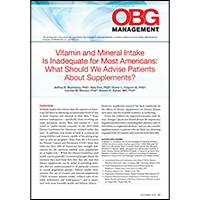User login
Allowed Publications
Slot System
Featured Buckets
Featured Buckets Admin
Reverse Chronological Sort
Intake of Vitamins and Minerals Is Inadequate for Most Americans: What Should We Advise Patients About Supplements?
Article Type
Changed
Display Headline
Intake of Vitamins and Minerals Is Inadequate for Most Americans: What Should We Advise Patients About Supplements?
This supplement examines the role of vitamin and mineral supplements in increasing nutrient intake and reducing nutrient deficiencies and inadequacies. Although research is needed to study the effects of dietary supplements on chronic disease outcomes, US health care providers need to know how to advise their patients about adding vitamins and minerals to their diets.
Sponsor
The development of this article was supported by the Campaign for Essential Nut…
Publications
Sections
Sponsor
The development of this article was supported by the Campaign for Essential Nut…
Sponsor
The development of this article was supported by the Campaign for Essential Nut…
This supplement examines the role of vitamin and mineral supplements in increasing nutrient intake and reducing nutrient deficiencies and inadequacies. Although research is needed to study the effects of dietary supplements on chronic disease outcomes, US health care providers need to know how to advise their patients about adding vitamins and minerals to their diets.
This supplement examines the role of vitamin and mineral supplements in increasing nutrient intake and reducing nutrient deficiencies and inadequacies. Although research is needed to study the effects of dietary supplements on chronic disease outcomes, US health care providers need to know how to advise their patients about adding vitamins and minerals to their diets.
Publications
Publications
Article Type
Display Headline
Intake of Vitamins and Minerals Is Inadequate for Most Americans: What Should We Advise Patients About Supplements?
Display Headline
Intake of Vitamins and Minerals Is Inadequate for Most Americans: What Should We Advise Patients About Supplements?
Sections
Disallow All Ads
Alternative CME
Consolidated Pubs: Do Not Show Source Publication Logo
Use ProPublica

